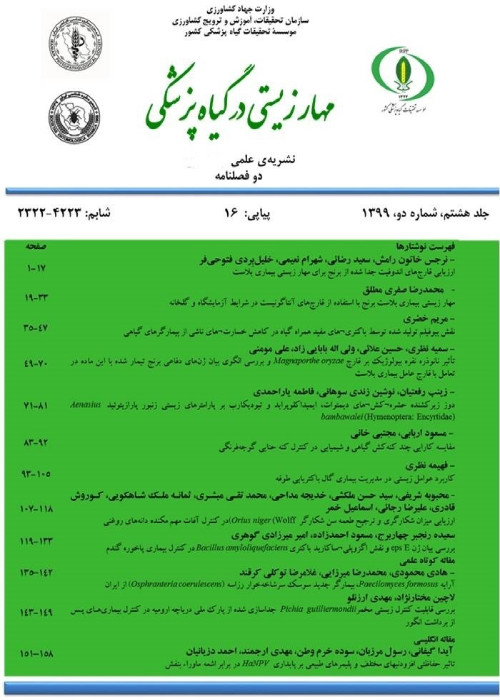Assessment of the Antagonistic Effects of bacteria isolated from Atrazine and Metribuzin-contaminated soil in sugarcane against Fungal Pathogens under Laboratory Conditions
Contaminated soil can be remediated by employing various types of microbes, such as bacteria, which have the ability to enhance plant growth and combat pathogenic microorganisms. Biological control is an environmentally adaptable method that utilizes living microorganisms like bacteria, fungi, and viruses to suppress plant pathogens through mechanisms such as competition, parasitism, antibiosis, and induced resistance. This study aims to assess the effectiveness of bioremediation bacteria as biological control agents against fungal pathogens affecting sugarcane. To achieve this objective, previously identified bacterial strains with potential in bioremediation of Atrazine and Metribuzin herbicides, including Brucella sp. (66A, 44A, and 65A), Pseudomonas putida 10A, Ensifer adhaerens 20m, Pseudomonas aeruginosa 15A, and Stenotrophomonas sp. 22A, were evaluated for their ability to inhibit the growth of Thielaviopsis ethacetica, Cytospora sacchari, Fusarium proliferatum, Bipolaris drechslera, Curvularia sp., Alternaria sp., and Nigrospora sp. The experiments were conducted using the dual culture method in a completely randomized design with three replications under laboratory conditions. The diameter of the bacterial inhibition zone and the percentage of fungal growth inhibition were calculated. The results indicated that P. aeruginosa 15A exhibited the highest growth inhibition against T. ethacetica, Curvularia sp., and Alternaria sp. On the other hand, Stenotrophomonas sp. 22A significantly inhibited C. sacchari, while both Stenotrophomonas sp. 22A and Brucella sp. 65A showed considerable inhibition against F. proliferatum. Bipolaris drechslera was most effectively inhibited by Brucella sp. 66A and Brucella sp. 44A, while P. aeruginosa 15A and Brucella sp. 66A exhibited prominent inhibition against Nigrospora sp. Notably, P. putida 10A did not display antagonistic properties against the tested fungi under laboratory conditions, whereas P. aeruginosa 15A significantly affected the growth of all examined fungi. Based on these findings, this study provides evidence that certain bioremediation isolates possess significant potential for biological control of specific fungal pathogens affecting sugarcane in laboratory conditions. Consequently, the antagonistic properties against important fungi in sugarcane can be utilized in agricultural activities. This strategy has the potential to decrease the reliance on fungicides in sugarcane farming, benefiting both the economy and the environment. Additionally, it can contribute to the maintenance and improvement of product quality and yield, while supporting sustainable cultivation..
- حق عضویت دریافتی صرف حمایت از نشریات عضو و نگهداری، تکمیل و توسعه مگیران میشود.
- پرداخت حق اشتراک و دانلود مقالات اجازه بازنشر آن در سایر رسانههای چاپی و دیجیتال را به کاربر نمیدهد.


